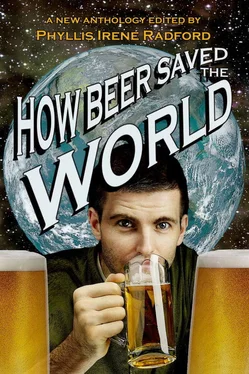Of all the müdder füching (55) dirty tricks , thought Gundar, certain that he and his brother peasants were completely had. But in that instant, a lifetime of bottled rage fountained up inside him, and, no longer caring how few minutes long his life might be, he tucked his head defiantly, and charged straight at the cannon with a bullish roar.
Fortunately, Gus’s fussy cannon was of the kind ignited by those silly six-inch fuses that burn down so slowly and dramatically in movies—which provided Gundar just sufficient time to close the gap and shoulder the cannon’s barrel upward as it went off with a deafening boom. Gundar felt his hair part on one side as the cannonball whizzed past on its way to hit a heavy metal plate bolted just above the entrance to support a hanging pulley system, then bounce back to fly with nearly as much speed across the chamber toward the high vat wall, into which it slammed and stuck, not ten feet above the heads of Gus’s startled henchmen. All of them turned now, looking up with open mouths to where the leaden ball hung half-embedded in the splintered wood. An instant later, with a tinny pinging sound, the cannonball popped loose and fell onto the upturned head of one unhappy henchman, who went down like a sack of sand. Where the cannonball had been lodged, a little fountain now appeared, spitting out a slender golden arc of beer, which splashed down onto other upturned faces among Gus’s corps—igniting momentary envy in Gundar and his crew. Then, an ominous grumbling sound issued from the vat’s straining wooden walls, rather like that of a stomach filled too full.
“ RUN!!! ” Gundar screamed, already racing for the granary entrance.
Being so near the door already, Gundar’s men just made it out as the awesome vat gave way. Only Gundar failed to make it through in time, though he was so few feet inside that the tidal wave of beer just picked him up and spat him through the straining entrance like an olive pit. Gundar’s wide-eyed men backed rapidly away, sure the granary’s quaking front wall would collapse at any moment. But it held, causing most of that unthinkable tide of beer to rebound off its inside face and surge back toward where Mad Gus and his henchmen lay broken and scattered now amidst the ruins of their ruptured vat. Afterward, it was surmised that the rebounding flood had gathered up all in its path and flung the load so forcefully at the already shaken building’s rear wall that it gave way at once.
As a sodden Gundar climbed back onto his feet out in the courtyard, his men and the remaining castle staff stood frozen, staring in shocked silence. Then, when it seemed certain that the front wall would stand, they began to move—first slowly, then with greater speed—back toward the granary door. Inside, they found nothing left but a giant frame for open air where once the granary’s back and the castle wall behind it had stood. Rushing to the vast gap’s edge, Gundar and his men looked down—a long, long way—at the still roiled and foaming waterfall, which plunged even more precipitously than usual into the valley’s sole outlet ravine, beside the steeply switch-backed trail that led one out of Dorn and down into the wider world. There was no sign of Mad Gus and his henchmen. The great tide of beer, in combination with the waterfall’s usual raging torrent, had washed them all away.
“ Mein gott in himmel !” (56) Gundar murmured. “We are free.” He turned, beaming at his brave companions. “We are free at last! To live however we wish! To eat all the food we grow! All the milk and cheese our cattle give us! To sleep nights without fearing for our homes or wives or children! To drink all the beer that we can make again—without fearing that some dummkopf in this castle might come take it all away! Do you hear me, brothers? WE ARE MAD GUS’S SLAVES NO LONGER !”
( Another lengthy pause, broken by the sounds of quiet weeping from Mr. Dourtmundschtradel . Then, after further sniffling, in a broken voice: )
As you may imagine, Herr Halifax, a great cheer went up at this. Not just from the village men, but from the castle staff as well.
There were many weeks of celebration after that, for there was no end of food and drink stored up in Gus’s remaining granaries and storerooms… I have no doubt it was… a very… beautiful time to be alive…
RH: What a tale, Herr Dourtmundschtradel! I’ve heard nothing more astonishing in all my years of research. I assume they all lived happily ever after?
GD: Ach , no, Herr Halifax. Regrettably, they did not.
RH: Oh dear. Did Mad Gus come back after all? Had he survived somehow?
GD: No, no. Nothing half so dire as that. They sent a party down the riverbed to look, of course. Wanting to be sure. But all they found were planks of wood, several dead henchmen, and a lot of inebriated fish, still flipping onto shore in drunken confusion. It is presumed all other bodies, including mad Lord Stephenson’s, lay tangled in the rocks and roots below the river’s countless rapid shoots and pools. Mad Gus was never seen again.
RH: Then what went wrong for them?
GD: Alas, they could not bring themselves to end their celebration, Herr Halifax. They had been so miserable for so long, and risked so much to free themselves, that no one thought they should be made to work again—on anything. Without a dictator to organize their labor and keep the valley’s complex civic logistics in motion, the peasants just ran out of goals, and food, and reasons to get up each day. (57)
RH: That’s… so sad.
GD: Not entirely, Herr Halifax. Not ultimately, at least. Their inability to live without a dictator forced them all to leave in search of another one to give some order to their lives again. This search for new enslavement caused them to disperse all over Europe, (58) bringing the previously secret knowledge of beer’s manufacture (59) with them everywhere they went. As I mentioned when we started, Gundar Dourtmund’s journey ended here, in what would much later come to be Germany. It was here that Gundar met my many-times great-grandmother, and we have been enjoying what he taught this country about brewing ever since. There are no better brewers in the world than ours, Herr Halifax. (60)How much more happiness can one demand of any ending, ja ?
--
(1) At the time of this interview, Mr. Dourtmundschtradel was 91 years old and largely confined to a wicker wheelchair. He died just two years later, having fallen, somehow, from his chair into an old well more than 500 meters from the house.
(2) Mr. Dourtmundschtradel’s English was quite good owing to a lifetime of extensive international travel and very active participation in American commodities markets, trading primarily in pork bellies.
(3) Not to be confused with Oxford Community College in the unincorporated town of Verylittleville, Ohio—or with Deerford Vocational School in Teenytinyville, Idaho, both commonly confused with Bisonford in Littleville, Iowa.
(4) Since this interview was conducted, the hamlet of Frauschlesundmunster has been leveled to accommodate an industrial bio-engineering facility and shopping complex. The Dourtmundschtradel ancestral farm now lies largely beneath the new development’s seventeen-acre parking structure. Hence the value in preserving oral history.
(5) An uncomplimentary German term referring to someone of questionable analytic skills.
(5) German term for ‘ya.’
(6) German phrase roughly translated into English as, ‘Akk to God in heaven!’
(7) Roughly translated: ‘The Age of Rather Long Stories;’ a very brief and obscure period between the Teutonic Age of Legends and the subsequent Time of Succinct Essays, which, in turn, ended some seven centuries prior to The Moment of Memos preceding what we now refer to as ‘recorded European history.’
Читать дальше











